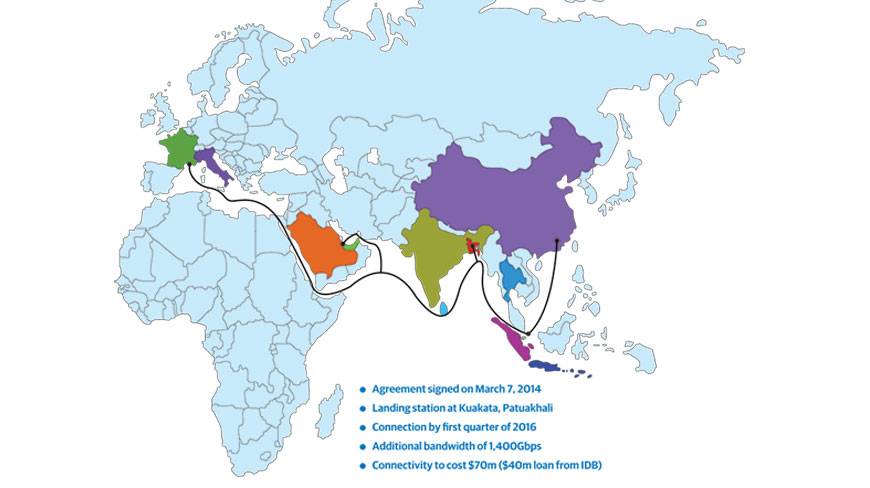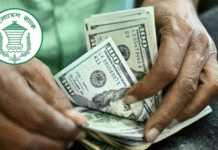Bangladesh has officially joined the submarine cable SEA-ME-WE-5 – its second – and hopes to get connected to it by the first quarter of 2016 which, officials concerned say, will help the country always stay online.
The Bangladesh Submarine Cable Company Ltd (BSCCL) yesterday inked an agreement for the construction and maintenance of the cable with 14 foreign companies at a programme held in Kuala Lumpur, Malaysia.
“It will be a high class connectivity for both data and voice between Southeast Asia and western Europe. The cable will primarily provide a bandwidth of 8Tbps, which will be increased up to 24Tbps,” a senior executive of the BSCCL told the Dhaka Tribune yesterday, requesting anonymity. The country would get an additional bandwidth of 1,400Gbps from the second submarine cable and would always be online even if one connection went down, said a BSCCL official.
Two or three more countries would join the 20,000km cable linking Singapore and France, he said.
Initially, the longevity of the cable has been fixed at 20 years, which may be increased up to 25 years.
The Singapore Telecommunications (SingTel), China Mobile, China Telecommunications, Emirates Integrated Telecommunications Company, Orange, PT Telekomunikasi Indonesia, Saudi Telecom Company, Telekom Malaysia and a few other companies from Sri Lanka, Thailand and India are involved in the project.
Md Abubakar Siddique, secretary of post, telecommunication and information communication ministry and chairman of the BSCCL, signed the agreement with 13 parties. BSCCL MD Monwar Hossain was also present at the deal-signing ceremony. Before leaving Dhaka, Monwar Hossain had told the Dhaka Tribune that the cable would connect Bangladesh through a landing station at Kuakata in Patuakhali.
“We have bought some land at Kuakata; a tender [for the job] will be floated shortly,” he said.
“When SEA-ME-WE-5 becomes live we will always be online even if one connection goes down,” said the BSCCL MD.
The SEA-ME-WE-4 landing station at Cox’s Bazar has frequently got offline since its installation. According to the BSCCL, joining the SEA-ME-WE-5 network will require $70 million (Tk540 crore).
The state-owned company has planned to borrow $40m from the Islamic Development Bank and provide the rest from its own fund. The BSCCL has already arranged Tk130 crore and still requires Tk100 crore, which it will collect from selling surplus bandwidth of the SEA-ME-WE-4 cable.
The IDB provided a loan also when the country got connected with SEA-ME-WE-4 at a cost of $35.2m and the BSCCL has already paid back the amount in 18 instalments.
A BSCCL official said an IDB delegation would visit the country by March 11 to settle matters regarding the $40m loan and meet with the finance minister and other high officials.
Before leaving for Kuala Lumpur, Monwar Hossain had said the connection with an alternative undersea cable would create more value to the country’s telecom and ICT sectors. The country would get additional bandwidth of 1,400Gbps.
Currently, the BSCCL has 200Gbps bandwidth and the government has allowed it to export half of it. The SEA-ME-WE-4 cable has already spent eight of its 20-year life time.
Bangladesh’s internet largely depends on SEA-ME-WE-4. In addition, six companies operate international terrestrial cables that provide backup connectivity through India.
Bangladesh got connected to the country’s first submarine cable SEA-ME-WE-4 in 2006. In the early 1990s, the then government had rejected a proposal for free connection with SEA-ME-WE-3.
The BSCCL had not made any official announcement on the deal as it was obliged to inform the Dhaka Stock Exchange first. It would make the matter public at a press conference this week, said an official.
In the only official statement on the submarine cable so far, SingTel said: “SEA-ME-WE-5 will address the urgent need for a new generation data superhighway to cater to the increasing demand for next generation Internet applications.”
Source: Dhaka Tribune










